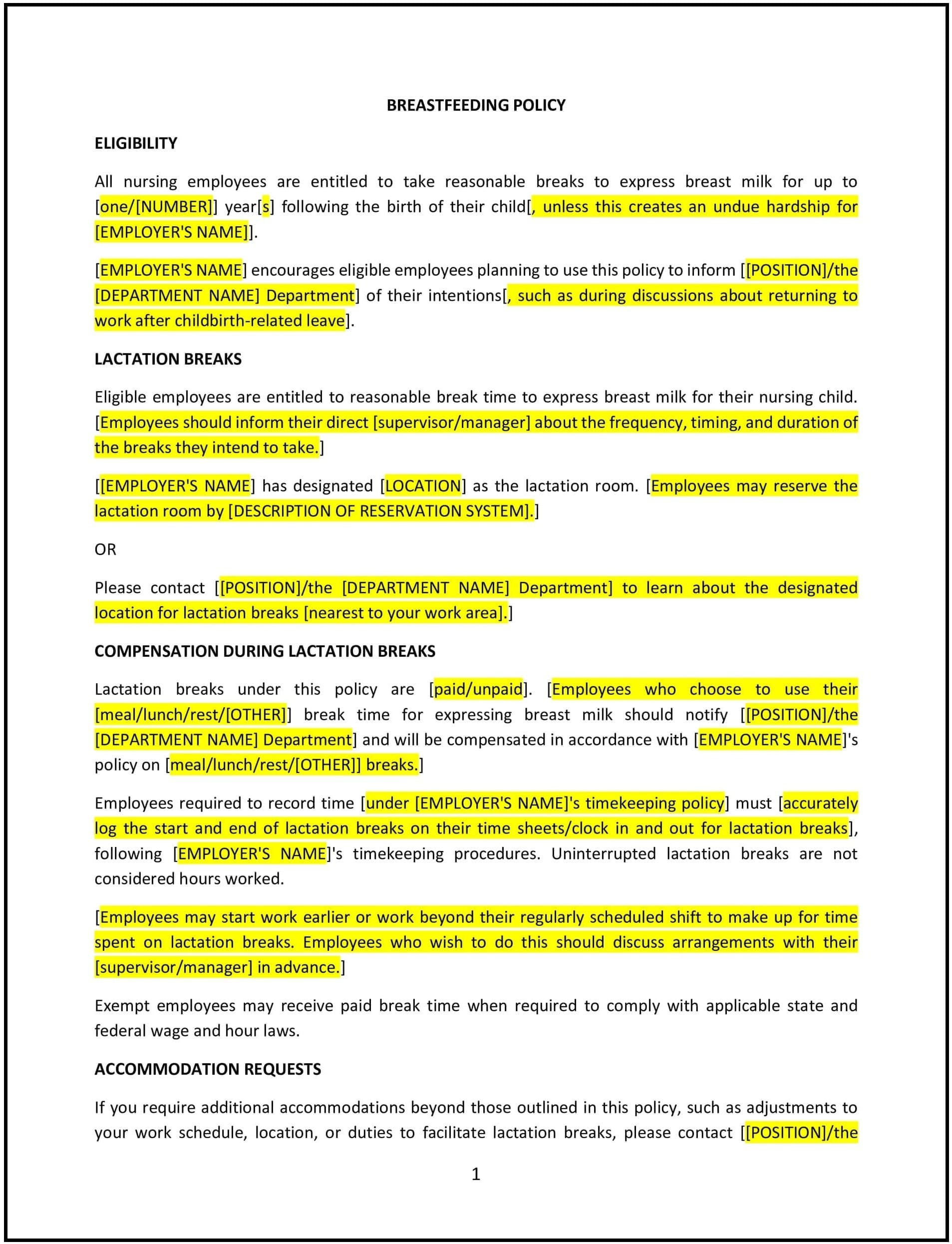Breastfeeding break policy (Massachusetts): Free template
Got contracts to review? While you're here for policies, let Cobrief make contract review effortless—start your free review now.

Customize this template for free
This breastfeeding break policy is designed to help Massachusetts businesses support employees who are breastfeeding by providing appropriate break time and facilities for expressing breast milk during work hours. The policy ensures that employees have access to the necessary breaks and private spaces to express milk, in compliance with Massachusetts state law and federal regulations, including the Fair Labor Standards Act (FLSA). The policy aims to promote a supportive and inclusive workplace for breastfeeding employees.
By adopting this policy, businesses can create a healthier work environment, enhance employee satisfaction, and demonstrate a commitment to supporting employees’ family needs while improving compliance with relevant laws.
How to use this breastfeeding break policy (Massachusetts)
- Define breastfeeding breaks: Clearly specify the duration and frequency of breaks employees are entitled to for breastfeeding or pumping. According to Massachusetts law and the FLSA, employers must provide reasonable break time for nursing mothers. The policy should clarify how these breaks will be structured, such as whether they will be paid or unpaid.
- Provide private spaces: Outline the company’s commitment to providing clean, private, and secure spaces for breastfeeding employees to express milk. The space should not be a bathroom and must be equipped with comfortable seating, electrical outlets, and appropriate hygiene facilities.
- Ensure flexible scheduling: Acknowledge that breastfeeding employees may need flexibility in scheduling their breaks, depending on their pumping needs. The policy should allow for reasonable adjustments to employees' schedules without negatively impacting business operations.
- Prohibit retaliation: Specify that breastfeeding employees will not face discrimination, retaliation, or adverse action for taking breaks. The policy should reinforce that breastfeeding breaks will not affect the employee’s employment status, performance evaluations, or advancement opportunities.
- Set up notification procedures: Require employees to notify their supervisors in advance of their need for breastfeeding breaks, including any potential adjustments to work schedules. The policy should specify how much notice is required and how employees should communicate their needs.
- Accommodate for work duties: Explain how the company will work with employees to adjust their job duties or work schedules to accommodate breastfeeding needs. This may include temporary changes in work responsibilities or arrangements to ensure the employee can meet their breastfeeding needs without disrupting work.
- Comply with Massachusetts and federal laws: The policy should ensure that all aspects are in compliance with Massachusetts state laws and federal regulations, including the Massachusetts Breastfeeding Protection Law and the FLSA, which mandates reasonable break time for nursing mothers.
Benefits of using this breastfeeding break policy (Massachusetts)
This policy offers several benefits for Massachusetts businesses:
- Supports employee well-being: By providing the necessary breaks and accommodations for breastfeeding employees, businesses foster a healthier and more supportive work environment. This policy helps employees balance work and family responsibilities, contributing to overall well-being.
- Enhances employee retention: Offering reasonable accommodations for breastfeeding employees can improve job satisfaction, which is particularly important for retaining female employees who are balancing professional and family commitments.
- Promotes inclusivity and diversity: The policy promotes a culture of inclusivity by supporting the needs of breastfeeding employees. It also signals that the company values work-life balance and is committed to providing equal opportunities for all employees.
- Improves legal compliance: By implementing this policy, businesses promote compliance with Massachusetts state laws and federal regulations regarding breastfeeding and lactation breaks, reducing the risk of legal challenges.
- Improves company reputation: Companies that demonstrate a commitment to supporting employees’ health and family responsibilities are seen positively by current and potential employees, as well as the public. This can enhance a business's reputation as an employer of choice.
- Increases productivity: When employees feel supported in managing their breastfeeding needs, they are more likely to remain focused, engaged, and productive. Providing the necessary breaks allows breastfeeding employees to manage their responsibilities without compromising work performance.
Tips for using this breastfeeding break policy (Massachusetts)
- Communicate the policy clearly: Ensure that all employees, especially those who are pregnant or breastfeeding, are aware of the breastfeeding break policy. This can be communicated through employee handbooks, orientation sessions, or HR discussions.
- Be flexible with scheduling: Provide flexibility in scheduling breastfeeding breaks to accommodate the employee’s needs while maintaining work efficiency. Work with employees to find appropriate times for breaks that do not interfere with business operations.
- Provide appropriate facilities: Ensure that the designated space for breastfeeding or pumping is clean, private, and equipped with the necessary resources. Regularly inspect these spaces to ensure they meet employees' needs.
- Be supportive and non-discriminatory: Reinforce a supportive approach to breastfeeding employees by ensuring that no employee is penalized for taking the necessary time to express milk. Create an environment where employees feel comfortable making use of their entitled breaks.
- Review and update the policy regularly: Ensure that the policy is compliant with changes in Massachusetts state laws, federal regulations, or best practices regarding workplace accommodations for breastfeeding employees. Regularly review and update the policy as necessary.